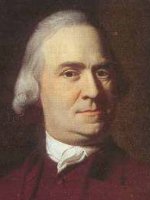Samuel Adams: "the psalm-singer"
 Yesterday's post discussed the nickname "Sam the Publican" for Samuel Adams, and why it almost certainly referred to his inadequate work as a town tax collector in the early 1760s. Biographer John C. Miller and other authors have taken that nickname as evidence that Adams hung around taverns, recruiting people for his political causes. After all, that was the West's image of "revolutionaries" in 1936, when Miller wrote. But Adams's political rivals in the 1700s had a very different complaint about him.
Yesterday's post discussed the nickname "Sam the Publican" for Samuel Adams, and why it almost certainly referred to his inadequate work as a town tax collector in the early 1760s. Biographer John C. Miller and other authors have taken that nickname as evidence that Adams hung around taverns, recruiting people for his political causes. After all, that was the West's image of "revolutionaries" in 1936, when Miller wrote. But Adams's political rivals in the 1700s had a very different complaint about him.
Probably the most delightfully cranky and gossipy account of the political disputes in Boston is Peter Oliver's "Origin and Progress of the American Revolution": A Tory View. Oliver was the last royal Chief Justice of Massachusetts, brother of the second-to-last royal Lieutenant Governor, and related by marriage to second-to-last royal governor, Thomas Hutchinson. Among Oliver's complaints about Adams was that he
had a good Voice, & was a Master in vocal Musick. This Genius he improved, by instituting singing Societys of Mechanicks [i.e., craftsmen], where he presided; & embraced such Opportunities to ye inculcating Sedition.Later in his account, Oliver refers to “Mr. Saml. Adams’s Psalm-singing Myrmidons.” (Myrmidons were fierce warriors in the Trojan War; out of that context, the word was an educated way of saying "thugs.")
John Mein, the printer who first published the "Samuel the Publican" insult, followed up by saying Adams was "noted for Psalm singing, & leader of the Band at Checkleys Meeting”—i.e., the Rev. Samuel Checkley's congregation at the New South Meeting-House. (Adams's first wife was Checkley's daughter.) John Fleeming, Mein's business partner, referred to Adams as "the psalm-singer" in the letter to Dr. Benjamin Church, Jr., that led to that doctor's exposure as a British agent in 1775.
In sum, the friends of the royal government agreed that Adams liked to sing psalms in church, and recruited working-men to the Whigs during choir rehearsals. That fits with Adams's conservative religious beliefs, which I've mentioned before. But it sure doesn't fit with our image of revolutionaries in taverns.

2 comments:
The main entry gives the impression that psalm-singing and tavern-going would have been mutually exclusive, and that Sam Adams would have had to do one or the other. Not so, as shown most vividly in an open letter by "Clarissa" in the Boston Gazette of March 10, 1766. Clarissa says she is a new student in town. She had gone to a service at New South Church (where Sam Adams and William Billings often sang) and found the new style of music there "fitted to elevate the languid soul, and administer reproof to every untuned heart."
This "sublime entertainment," together with her belief that her own voice was a good one, led her to try a "singing party for the improvement of learners."
Clarissa was "surprized" to find, not a grave and pious assembly but "a large company, in all the spirit of gaity, professedly convened for amusement, or instruction in the use of the voice, and declaring by their whole conduct this was all they meant." They were indeed occupied in singing psalms, but moved quickly back and forth between that and "a chearful joke, a glass of wine, or the repeated plaudits of the hearers."
If a relatively decorous lot (a "Rev. Divine" was among its number) was drinking and joking, one would guess that Adams' "Mechanicks" singers were looser still.
I’m not sure we can take a satirical piece in the newspaper as fully accurate. It does reflect, however, how religious gatherings and revivals in early America were often social events—including a way to meet young people of the opposite sex.
I agree that there’s no reason that psalm-singers couldn’t also frequent taverns. I don’t believe the posting implied otherwise.
Rather, my point was that we have two of Samuel Adams’s enemies and some of his friends and relations writing that he enjoyed psalm-singing, and one political foe complaining that he used that activity to recruit young men to his political cause. We have no contemporaries complaining that he frequented taverns or recruited men there. We have many historians misinterpreting the insult “Sam the Publican,” and giving readers a false sense of the man.
Post a Comment